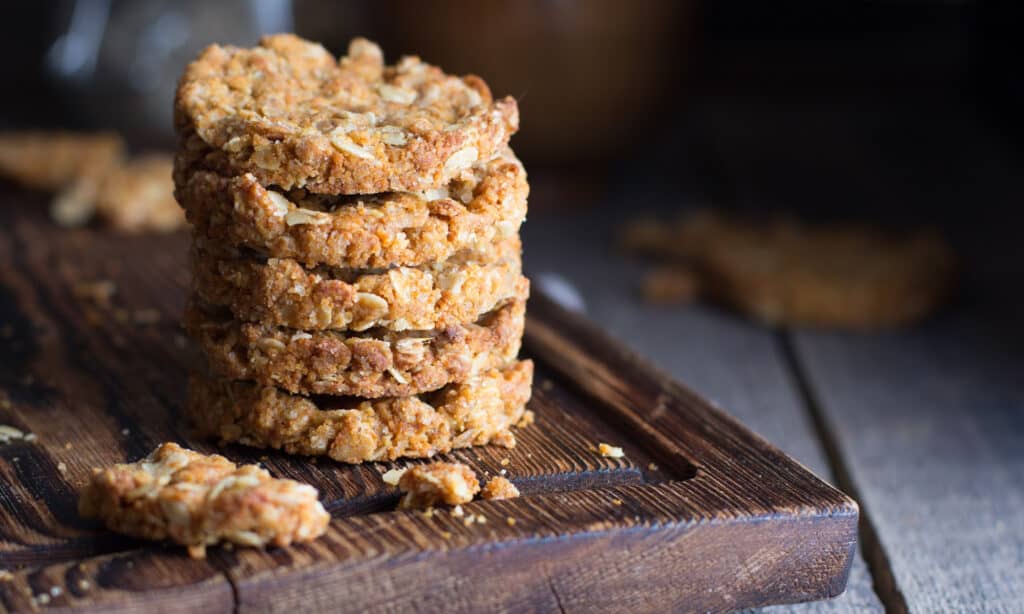As loving dog owners, we always want the best for our four-legged friends, and that includes keeping them safe and healthy. Naturally, questions arise about what foods are safe for our pets to eat, and what might be dangerous. One treat that often sparks curiosity is the oatmeal cookie. While it may appear innocent, certain ingredients can pose risks to our canine companions. In this blog, we’ll delve into whether it’s safe for dogs to eat oatmeal cookies, examining the concerns for puppies, adult dogs, sick dogs, and those with diarrhea. We’ll also take a closer look at the common ingredients and spices in these cookies, identify potential hazards, and discuss the differences between human and dog-friendly cookies. Lastly, we’ll outline the symptoms of oatmeal cookie toxicity and share solutions to help ensure your dog stays happy and healthy.

Can Dogs Eat Oatmeal Cookies?
Dogs should generally avoid eating oatmeal cookies, especially those made for human consumption. While oats themselves can be beneficial for dogs in moderate amounts, providing fiber and essential nutrients, the other ingredients commonly found in oatmeal cookies can pose risks to your pet’s health.
Ingredients like sugar, chocolate, raisins, and certain spices are not suitable for dogs and can lead to serious health complications if consumed. Here is a breakdown of the potential risks:
- Sugar: High sugar content in oatmeal cookies can contribute to obesity, dental problems, and diabetes in dogs. It is best to avoid feeding your dog sugary treats and opt for healthier alternatives.
- Chocolate: Chocolate is toxic to dogs due to theobromine and caffeine. These can cause vomiting, diarrhea, seizures, and even death.
- Raisins: Raisins and grapes can cause kidney failure in dogs, even in small amounts. Symptoms of toxicity include vomiting, diarrhea, abdominal pain, lethargy, and lack of appetite.
- Xylitol: Some oatmeal cookies may contain the artificial sweetener xylitol, which is extremely toxic to dogs. Ingesting xylitol can lead to rapid insulin release, causing hypoglycemia (low blood sugar), seizures, liver failure, or even death.
- Spices: Certain spices, such as nutmeg, can be toxic to dogs. They can cause disorientation, increased heart rate, high blood pressure, and seizures.
It’s important to note that dogs have different dietary needs than humans and should be given treats specifically formulated for them. If you’d like to give your dog an oatmeal-based treat, consider making a dog-friendly oatmeal cookie recipe, like this one:
Dog-Friendly Oatmeal Cookie Recipe
Ingredients:
- 1 1/2 cups rolled oats
- 1 cup whole wheat flour
- 1/2 cup unsweetened applesauce
- 1/4 cup natural, unsalted peanut butter
- 1/4 cup low-sodium chicken or vegetable broth
- 1 large egg
- 1/2 teaspoon cinnamon
- 1 tablespoon honey (optional)
Instructions:
- Preheat your oven to 350°F (175°C) and line a baking sheet with parchment paper or a silicone baking mat.
- In a large mixing bowl, combine the rolled oats and whole wheat flour. Mix well.
- In a separate bowl, mix together the unsweetened applesauce and natural, unsalted peanut butter. Add the chicken or vegetable broth and mix until smooth. If you’d like a slightly sweeter treat for your pup, stir in the optional honey.
- Crack the egg into the wet mixture and whisk to combine.
- Gradually pour the wet mixture into the dry mixture, stirring until fully incorporated. The dough should be thick and slightly sticky.
- Fold in the cinnamon, ensuring it is evenly distributed throughout the dough.
- Using a tablespoon or small cookie scoop, drop balls of dough onto the lined baking sheet, spacing them about 2 inches apart. Press dough with spoon/palm to flatten for desired cookie thickness.
- Bake the cookies for 20-25 minutes or until they’re golden brown and firm to the touch. The longer you bake them, the crunchier they’ll be.
- Let cookies cool briefly on baking sheet before moving to wire rack for complete cooling.
- Once cooled, store in an airtight container for up to a week in the refrigerator. Or freeze them for up to 3 months.
Remember, these cookies are intended as occasional treats and should not replace your dog’s regular diet.

Ingredients and Spices Typically Found in Oatmeal Cookies
Oatmeal cookies are a popular treat known for their chewy texture and comforting taste. While the ingredients may vary depending on the specific recipe, here are some common ingredients and spices typically used in oatmeal cookies:
- Oats: As the main ingredient, rolled or old-fashioned oats provide texture and chewiness to the cookies. Oats are rich in fiber, antioxidants, and essential nutrients.
- Flour: All-purpose or whole wheat flour is used as the base for the cookie dough, providing structure and helping the cookies hold their shape.
- Sugar: Brown sugar and granulated sugar are used to sweeten oatmeal cookies, contributing to their flavor and texture.
- Butter or oil: Butter, margarine, or vegetable oil is added to the dough to provide richness, moisture, and a tender crumb.
- Eggs: Eggs are used as a binder and help to give the cookies structure and a slightly cakey texture.
- Baking powder and/or baking soda: These leavening agents help the cookies rise and create a light, fluffy texture.
- Vanilla extract: Vanilla extract adds flavor and enhances the taste of other ingredients.
- Spices: Cinnamon and nutmeg are common spices added to oatmeal cookies for a warm, comforting flavor. Other spices like ginger or allspice may also be used.
- Add-ins: Oatmeal cookies can be customized with various add-ins, such as chocolate chips, raisins, nuts (walnuts, pecans, or almonds), and dried fruits (cranberries, cherries, or apricots).
While these ingredients and spices are generally safe for human consumption, it’s important to remember that some of them can be harmful to dogs. As mentioned earlier, chocolate, raisins, and certain spices like nutmeg can pose serious health risks to your canine companion. When making oatmeal cookies for your dog, it’s essential to use a dog-friendly recipe and avoid ingredients that can be toxic or harmful to their health.
Nutrients in Oatmeal Cookies
Oatmeal cookies contain a mix of nutrients due to the various ingredients used in the recipe. However, it is important to note that they are not an ideal source of nutrition for dogs. Here are some nutrients commonly found in oatmeal cookies:
- Carbohydrates: Oats, flour, and sugar contribute to the carbohydrate content in oatmeal cookies. While oats provide complex carbohydrates and dietary fiber, the added sugar is a source of simple carbohydrates that can negatively impact a dog’s health if consumed in large quantities.
- Protein: Oats and eggs offer some protein in oatmeal cookies, but the amount is relatively low compared to a dog’s daily protein requirements.
- Fats: Butter or oil used in oatmeal cookies contribute fats, which can provide energy and contribute to a tender texture in the cookies. However, these fats are not the most suitable for dogs, and excessive consumption can lead to obesity and other health issues.
- Fiber: Oats are a good source of dietary fiber, which can help with digestion and support overall gut health. However, the fiber content in oatmeal cookies may not be sufficient to provide significant benefits for dogs.
- Vitamins and minerals: Oats contain essential nutrients like B vitamins, iron, magnesium, and zinc. However, the levels of these nutrients in oatmeal cookies may not be significant enough to contribute to a dog’s daily requirements, particularly when other unhealthy ingredients are included.
While oatmeal cookies do contain some nutrients, they are not a balanced or ideal source of nutrition for dogs. It is important to remember that dogs have different dietary needs than humans, and feeding them treats specifically formulated for their nutritional requirements is essential. If you want to provide your dog with an oatmeal-based treat, consider making a dog-friendly recipe that omits harmful ingredients and prioritizes their health.

Cookies Made for Humans vs. Cookies Made for Dogs
While cookies might seem like a delicious treat for both humans and dogs, it’s essential to understand the differences between cookies made for humans and those made specifically for dogs. The primary differences lie in the ingredients, nutritional content, and the purpose they serve.
- Ingredients: Human cookies often contain ingredients that can be harmful or toxic to dogs, such as chocolate, raisins, xylitol, and certain spices. Dog-friendly cookies contain safe ingredients for dogs, such as whole grains, dog-friendly fruits/veggies, and natural sweeteners like honey.
- Nutritional content: Human cookies are typically high in sugar, fats, and calories, which can contribute to health issues like obesity, dental problems, and diabetes in dogs.
- Purpose: Human cookies are primarily made for taste and enjoyment, while dog-friendly cookies are designed to serve as treats that can provide some nutritional benefits or support training and positive reinforcement. Dog treats are often made with specific purposes, such as dental chews for dental health, calming treats for anxiety, or high-protein treats for training purposes.
- Portion sizes: Cookies made for humans are often larger and contain more calories than those made for dogs. Dog-friendly cookies are generally smaller in size, making it easier to control portions and avoid overfeeding.
- Additives and preservatives: Human cookies may contain artificial additives, preservatives, or colors that are not suitable for dogs. Dog-friendly cookies often use natural ingredients and avoid potentially harmful additives.
It’s crucial to differentiate between cookies made for humans and those made for dogs. Feeding your dog human cookies can result in health complications due to harmful ingredients and improper nutritional content. Instead, opt for dog-friendly cookies that are formulated with your pet’s well-being in mind, and always consult with your veterinarian if you have concerns about your dog’s diet and treat options.
Symptoms of Toxicity in Dogs
Oatmeal cookie toxicity in dogs can occur if they consume cookies containing harmful ingredients, such as chocolate, raisins, xylitol, or certain spices. Each toxic ingredient can cause different symptoms in dogs. Here are some of the symptoms associated with the ingestion of these harmful ingredients:
- Chocolate toxicity:
- Vomiting
- Diarrhea
- Rapid breathing
- Increased heart rate
- Restlessness
- Tremors
- Seizures
- In severe cases, coma or death
- Raisin and grape toxicity:
- Vomiting
- Diarrhea
- Abdominal pain
- Lethargy
- Lack of appetite
- Dehydration
- Increased urination followed by decreased or no urination (due to kidney failure)
- Xylitol poisoning:
- Vomiting
- Weakness
- Lack of coordination
- Seizures
- Rapid insulin release leading to hypoglycemia (low blood sugar)
- In severe cases, liver failure or death
- Allergic reactions to certain ingredients or spices:
- Swelling around the face, mouth, or throat
- Hives or rash
- Difficulty breathing
- Vomiting
- Diarrhea
- Itchiness
If you suspect your dog has consumed an oatmeal cookie containing any of these toxic ingredients, it’s crucial to act quickly. Contact your veterinarian or an emergency animal clinic immediately for advice on how to proceed. In some cases, inducing vomiting may be recommended, but it’s essential to consult a professional before attempting this at home.
Early intervention is key to preventing serious complications and ensuring your dog’s safety. It’s also important to take preventative measures, such as keeping human foods out of your dog’s reach and providing them with dog-friendly treats made with safe ingredients.

Solutions for Treating Toxicity in Dogs
If you suspect your dog has consumed an oatmeal cookie containing toxic ingredients, it’s crucial to seek immediate veterinary care. Your veterinarian will determine the appropriate course of action based on the specific toxic ingredient ingested and the severity of your dog’s symptoms. Here are some possible solutions and treatments for oatmeal cookie toxicity in dogs:
- Inducing vomiting: In some cases, your veterinarian may recommend inducing vomiting to help expel the toxic substance from your dog’s system. This should only be done under the guidance of a veterinarian, as inducing vomiting inappropriately can cause harm to your dog.
- Activated charcoal: Your veterinarian may administer activated charcoal, which can help bind to the toxic substance and prevent it from being absorbed into your dog’s bloodstream. This can reduce the severity of the toxic effects.
- Intravenous (IV) fluids: Administering IV fluids can help to flush toxins from your dog’s system, prevent dehydration, and maintain electrolyte balance, particularly in cases of chocolate or raisin toxicity.
- Medications: Depending on the symptoms and toxic ingredients, your veterinarian may prescribe medications to help manage your dog’s condition. These may include anti-seizure medications, anti-nausea medications, or medications to protect the liver in cases of xylitol poisoning.
- Monitoring: In severe cases or with life-threatening symptoms, hospitalization may be recommended. Your vet will provide monitoring and supportive care.
- Supportive care: Providing supportive care, such as maintaining a comfortable environment, encouraging hydration, and offering a bland diet, can help your dog recover from the effects of oatmeal cookie toxicity.
Prevention is key to ensuring your dog’s safety. Be sure to keep human foods out of your dog’s reach, educate family members and guests about the dangers of feeding your dog harmful foods, and provide your dog with dog-friendly treats made with safe ingredients.

Conclusion
In conclusion, while oatmeal cookies may seem like a tempting treat to share with your canine companion, it’s essential to be aware of the potential risks associated with feeding them human cookies. Ingredients commonly found in oatmeal cookies, such as chocolate, raisins, xylitol, and certain spices, can be toxic to dogs and lead to severe health complications. Instead of sharing human cookies with your pet, opt for dog-friendly treats made with safe ingredients that cater to their specific dietary needs.
If you suspect your dog has consumed a toxic oatmeal cookie, it’s crucial to seek immediate veterinary care for appropriate treatment and monitoring. Prevention is key to ensuring your dog’s safety and well-being. Educate yourself and others about the potential dangers of feeding dogs human foods and always consult with your veterinarian if you have concerns about your dog’s diet and treat options. By making informed decisions about your dog’s treats, you can help keep them healthy and happy for years to come.
~Sheena
Sailer, C. (2017, June 6). Can My Dog Eat Oatmeal Cookies? The Dog People by Rover.com. https://www.rover.com/blog/can-dog-eat-oatmeal-cookies/
